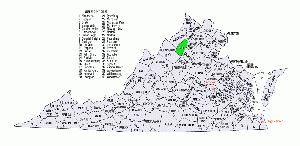Page County (Virginia, USA)
Page County, Virginia, is situated in the valley drained by the South Fork of the Shenandoah River. This river flows north between the Massanutten Mountain and the Blue Ridge (Shenandoah Forest). It was near Luray, the county seat, that the first and largest settlement of Mennonites was made in Virginia in the second quarter of the 18th century. This area had had a, checkered political history before it became Page County. It was at first in Spotsylvania County that originally included all the land in Virginia west of the Blue Ridge. In 1734-1738 it was a part of Orange County, 1738-1745 of Augusta County, 1745-1772 of Frederick County, and 1772-1831 of Shenandoah County. Then in 1831 that part of Shenandoah County lying between the Massanutten Mountain and the Blue Ridge was taken to form Page County.
The Mennonites came to Page County from Bucks, Berks, and Lancaster counties, Pennsylvania, as early as 1727, settling along the South Fork of the Shenandoah River and its tributaries. The settlement prospered during its first 25 years. Perhaps one meetinghouse, the old Hamburg church, a union church (still standing), was built at this time. If so, it was the first church that the Mennonites helped to build in Virginia. In the late 1950s a Harmonia Sacra Singing was held in this old church annually.
This early settlement was not without its hardships. In 1758 an Indian raid, associated with the French and Indian War, practically wiped out the settlement for a short time. The people fled to Pennsylvania, where an appeal was made to the Dutch Mennonites for help in a letter that is found in the [[Amsterdam Mennonite Library (Bibliotheek en Archief van de Vereenigde Doopsgezinde Gemeente te Amsterdam)|Amsterdam Mennonite Archives]]. This letter, dated 7 September 1758, and signed by Michael Kauffman, Jacob Boner, Samuel Bohm, and Daniel Stauffer, says, "We were thirty-nine Mennonite families living together in Virginia. One family was murdered and the rest of us and many other families were obliged to flee for our lives, leaving all and going empty-handed." The letter goes on to say that in addition to "our brother and companion in the faith Johannes Schneyder, who is contemplating a journey to the friends and brethren in Holland, . . . our minister and elder, Martin Funck," would go along to Holland to assist in presenting the request for help. Funck was "still a single man, and by occupation a miller. He, too, was compelled to flee and leave all behind." Apparently Martin Funck was the bishop of the Page County congregation, which numbered 39 families or about 100 members in 1758.
In 1764 eight Indians led by a white man killed Preacher John Rhodes (Roads) and members of his family. This is known in Virginia history as the "Rhodes Massacre." The house and barn on the old Rhodes homestead were burned.
Decline began when a number of Mennonites joined the Baptist Church prior to and after the American Revolution. A number of Page County Mennonites moved elsewhere. Local leadership in the church was not maintained. The dwindling membership was served by Rockingham County preachers until 1885, when there were not enough members left in Page County to justify the 30 or more miles of travel to serve them.
Bibliography
Brunk, H. A. Early Mennonite Settlements in Virginia. Harrisonburg, 1959.
"Experience of Mennonite Settlers in Virginia." Mennonite Yearbook & Almanac (1911): 18.
| Author(s) | Harry A Brunk |
|---|---|
| Date Published | 1959 |
Cite This Article
MLA style
Brunk, Harry A. "Page County (Virginia, USA)." Global Anabaptist Mennonite Encyclopedia Online. 1959. Web. 12 Feb 2026. https://gameo.org/index.php?title=Page_County_(Virginia,_USA)&oldid=170500.
APA style
Brunk, Harry A. (1959). Page County (Virginia, USA). Global Anabaptist Mennonite Encyclopedia Online. Retrieved 12 February 2026, from https://gameo.org/index.php?title=Page_County_(Virginia,_USA)&oldid=170500.
Adapted by permission of Herald Press, Harrisonburg, Virginia, from Mennonite Encyclopedia, Vol. 4, p. 105. All rights reserved.
©1996-2026 by the Global Anabaptist Mennonite Encyclopedia Online. All rights reserved.

